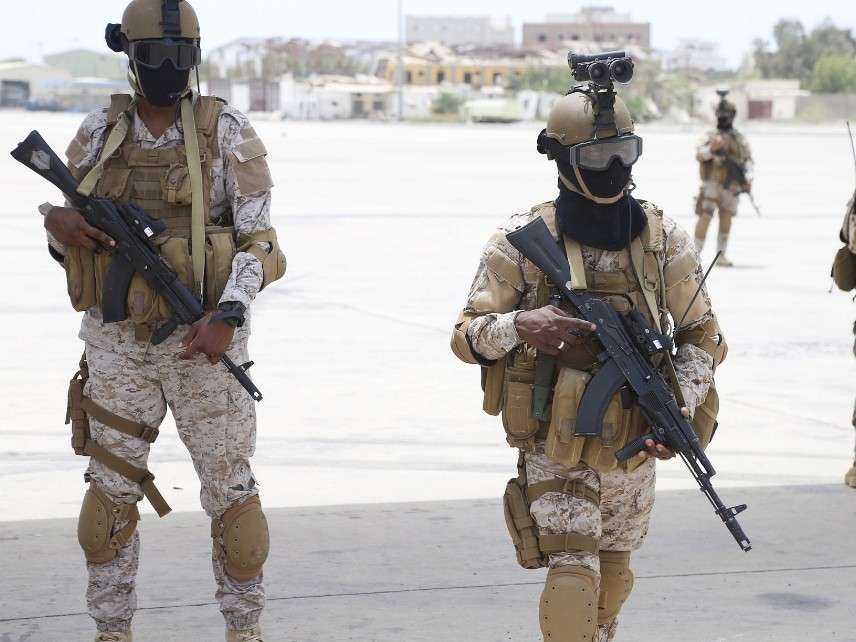House Passes Bill To End U.S. Support for Saudi Involvement in Yemen; Rep. Justin Amash Votes 'Present'
Amash had an interesting reason for not voting "yes."

The House of Representatives approved a resolution Wednesday that would largely end U.S. military involvement in the Yemeni civil war.
Eighteen Republicans joined the vast majority of House Democrats in approving the resolution, which serves as a rebuke to the Trump administration's policy of providing, without congressional authorization, some military aid to the Saudi Arabian-led coalition fighting Iran-backed Houthi rebels. Republican support for the bill came largely from the House Freedom Caucus, though Rep. Justin Amash (R–Mich.), an outspoken critic of U.S. involvement in the Yemen conflict, notably voted "present" rather than "yes."
The resolution itself cited the War Powers Act of 1973, which seeks to ensure that the president only commits U.S. military forces to conflicts abroad if he has congressional approval. The resolution reads:
Congress hereby directs the President to remove United States Armed Forces from hostilities in or affecting the Republic of Yemen, except United States Armed Forces engaged in operations directed at al-Qaeda or associated forces, by not later than the date that is 30 days after the date of the enactment of this joint resolution (unless the President requests and Congress authorizes a later date), and unless and until a declaration of war or specific authorization for such use of United States Armed Forces has been enacted.
While U.S. forces are not directly involved in the fighting, they have assisted the Saudi coalition by sharing intelligence and proving logistical support, according to the Washington Post. U.S. forces also supported the Saudis with aerial refueling, but ceased doing so last year.
"More than 14 million Yemenis—half the country—are on the brink of famine, and at least 85,000 children have already died from hunger and disease as a result of the war," the bill's lead sponsor, Rep. Ro Khanna (D–Calif.), said after the vote, reported Politico. Khanna previously introduced the resolution in 2017.
The bill argues that U.S. involvement in Yemen falls under under the War Powers Act, which encompasses "the assignment of members of such armed forces to command, coordinate, participate in the movement of, or accompany the regular or irregular military forces of any foreign country or government when such military forces are engaged, or there exists an imminent threat that such forces will become engaged, in hostilities." According to Khanna's resolution, the "activities that the United States is conducting in support of the Saudi-led coalition, including aerial refueling and targeting assistance, fall within this definition."
The Trump White House disagrees. In a statement Monday, the administration claimed the resolution's premise is "flawed" because U.S. forces in the area have not been "introduced into hostilities." The resolution would also "harm bilateral relationships in the region, negatively affect our ability to prevent the spread of violent extremist organizations…and establish bad precedent for future legislation by defining 'hostilities' to include defense cooperation such as aerial refueling for purposes of this legislation," the statement reads.
But Khanna is bringing up valid points. Congress has indeed never voted to authorize U.S. involvement in Yemen. And Saudi aggression in the country has caused a horrific humanitarian crisis. According to one United Nations report, the Saudi-led coalition was responsible for 370 of 552 recorded child casualties in 2017. In total, more than 57,000 people have been killed in the conflict since the start of 2017, the Associated Press reported in November. When you include the casualties from the last nine months of 2015, that number will likely reach 70,000 or 80,000.
Members of Congress from both parties—including Sens. Mike Lee (R–Utah), Rand Paul (R–Ky.), and Bernie Sanders (I-Vt.)—have called for an end to U.S. involvement in the conflict. But Amash, who's long been one of those critics, did not vote "yes" on Khanna's resolution. On Twitter, he explained why.
Amash pointed out that the legislation expands the 2001 Authorization for Use of Military Force, which gives the president power to take military action against any nation or person he believes to have been involved in the 9/11 terror attacks. "The legislation makes an exception for 'Armed Forces engaged in operations directed at al-Qaeda or associated forces,'" Amash wrote. "The notion of undefined 'associated forces' is not part of the 2001 AUMF and significantly expands it."
Amash also voted "present" on a motion that added an amendment condemning anti-Semitism to the Yemen bill. The motion ended up passing 424-0 anyway, though libertarian-leaning Rep. Thomas Massie (R–Ky.) also voted "present" before voting "yes" on the resolution itself. Both lawmakers later explained they did not support the amendment because it was totally unrelated to the Yemen bill. In the end, most of the Republicans who voted to add the amendment rejected the bill as a whole.
The resolution now moves to the Senate, which passed a similar measure in December. Even if the bill does get a majority of the votes in the upper chamber of the Congress, Trump is likely to veto it. A two-thirds majority in both the House and Senate would be needed to override his veto and make the resolution binding.


Show Comments (9)